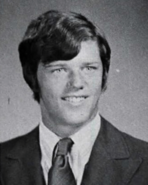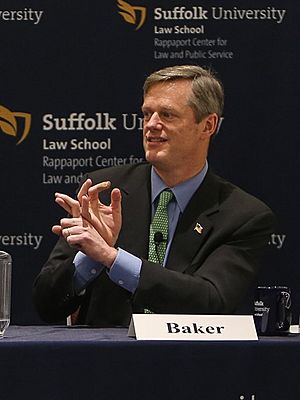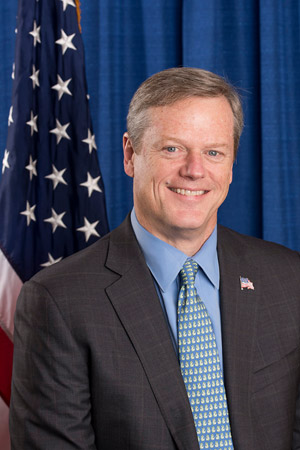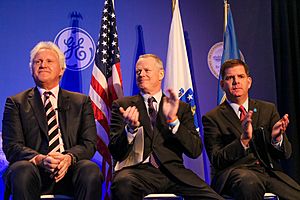Charlie Baker facts for kids
Quick facts for kids
Charlie Baker
|
|
|---|---|
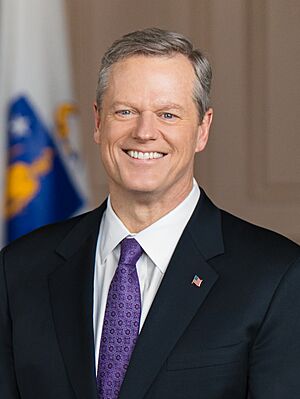
Official portrait, 2018
|
|
| 6th President of the National Collegiate Athletic Association | |
| Assumed office March 1, 2023 |
|
| Preceded by | Mark Emmert |
| 72nd Governor of Massachusetts | |
| In office January 8, 2015 – January 5, 2023 |
|
| Lieutenant | Karyn Polito |
| Preceded by | Deval Patrick |
| Succeeded by | Maura Healey |
| Secretary of Administration and Finance of Massachusetts | |
| In office November 1994 – September 1998 |
|
| Governor | Bill Weld Paul Cellucci |
| Preceded by | Mark E. Robinson |
| Succeeded by | Frederick Laskey |
| Secretary of Health and Human Services of Massachusetts | |
| In office October 1992 – November 1994 |
|
| Governor | Bill Weld |
| Preceded by | David Forsberg |
| Succeeded by | Gerald Whitburn |
| Personal details | |
| Born |
Charles Duane Baker Jr.
November 13, 1956 Elmira, New York, U.S. |
| Political party | Republican |
| Spouse |
Lauren Schadt
(m. 1987) |
| Children | 3 |
| Relatives | Charles Baker (father) |
| Education | |
| Signature | |
Charles Duane Baker Jr. (born November 13, 1956), known as Charlie Baker, is an American leader who is the current president of the National Collegiate Athletic Association (NCAA). Before this, he was a politician in the Republican Party. He served as the 72nd governor of Massachusetts from 2015 to 2023.
Baker has a long history in both business and government. Before becoming governor, he was the head of Harvard Pilgrim Health Care, a major health insurance company. He also worked for two other Massachusetts governors, helping to manage the state's health care and finances.
As governor, Baker was known for being a moderate Republican in a mostly Democratic state. Polls often showed he was one of the most popular governors in the United States. In 2022, he decided not to run for a third term. He then accepted the job to lead the NCAA, which oversees sports programs for student-athletes at over 1,000 colleges and universities.
Contents
Early Life and Education
Charlie Baker was born on November 13, 1956, in Elmira, New York. His family has a long history in politics. His great-grandfather and grandfather were both involved in government. His father, Charles D. Baker, worked for the U.S. government under Presidents Richard Nixon and Ronald Reagan.
Baker grew up in Needham, Massachusetts. As a kid, he loved playing sports like football, hockey, and baseball. His family moved to Washington, D.C. for a few years when his father took a government job, but they returned to Needham in 1971. He graduated from Needham High School in 1975.
After high school, Baker went to Harvard College, where he earned a degree in English in 1979. He later went to Northwestern University's Kellogg School of Management to get a Master of Business Administration (MBA), which is a degree focused on business skills.
Early Career in Government and Business
Working for Massachusetts
In the early 1990s, Baker began working in Massachusetts state government. Governor Bill Weld hired him to help run the state's health and human services department. In 1992, he was promoted to be the head of that department, called the Secretary of Health and Human Services.
Later, he became the Secretary of Administration and Finance. This meant he was in charge of the state's budget and money. He was known as a key planner for the financing of the Big Dig, a massive highway project in Boston.
Career in the Health Industry
In 1998, Baker left government to work in the health care industry. He became the CEO of Harvard Pilgrim Health Care, a large non-profit health insurance company. The company was losing a lot of money at the time. Baker made many changes to help turn the company around and make it successful. For five years in a row, it was named "America's Best Health Plan" by a national group.
Political Career
First Run for Governor
After his success in business, Baker decided to run for governor of Massachusetts in 2010. He ran as a Republican who was careful with money but had more liberal views on social issues. He wanted to focus on creating jobs and improving the economy.
He ran against the current governor, Deval Patrick, a Democrat. It was a tough election, and Baker lost, getting 42% of the vote compared to Patrick's 48%. After the election, Baker returned to the business world for a few years.
Winning the Governor's Office
Baker decided to run for governor again in 2014. This time, Governor Patrick was not running for reelection. Baker's main opponent was the Democratic nominee, Martha Coakley. The election was very close, but Baker won with 48.4% of the vote. He became the 72nd governor of Massachusetts on January 8, 2015.
Governor of Massachusetts (2015–2023)
As governor, Charlie Baker was known for working with both Republicans and Democrats. He was often called a moderate, or "middle-of-the-road," Republican.
Reelection in 2018
Baker remained very popular throughout his first term. When he ran for reelection in 2018, he won by a large margin. He received 67% of the vote, defeating Democratic challenger Jay Gonzalez. It was the biggest victory for a governor in Massachusetts since 1994.
Economic Policy
Baker focused on making Massachusetts a good place for businesses. His administration offered money to help General Electric, a very large company, move its main office to Boston. He also supported programs to create jobs in technology, robotics, and life sciences (like medicine and biology). He started a program that gave money to towns and cities to help them improve their communities.
Transportation Policy
Baker's government worked on improving roads, bridges, and public transit. After a winter with record-breaking snow, he started a fund to fix potholes across the state. His administration also oversaw the switch to an all-electronic tolling system on the Massachusetts Turnpike. He signed a law that made it illegal to use a handheld cell phone while driving to improve safety.
Education Policy
Baker supported creating more charter schools, which are public schools that are run differently from traditional schools. He also worked to make college more affordable. One program he supported made tuition free for certain low-income students from Boston who attended local community colleges.
Energy and Environment
Governor Baker took steps to address climate change. He signed laws to increase the state's use of clean energy, like wind power and hydropower. After the U.S. left the Paris Agreement on climate change, Baker joined with other governors to promise that their states would continue to work to reduce pollution. His administration also created a plan to help Massachusetts prepare for the effects of climate change, like rising sea levels.
Health Care Policy
With his background in health care, Baker focused on making sure people in Massachusetts had access to good health insurance. He worked with the federal government on the Patient Protection and Affordable Care Act (ACA). When there were efforts to repeal the ACA, Baker spoke out against them, saying it would harm many people in his state.
He also took major steps to address the state's public health challenges. His administration launched programs to provide more treatment and support for people struggling with health issues.
President of the NCAA
On December 15, 2022, it was announced that Charlie Baker would become the new president of the National Collegiate Athletic Association (NCAA). The NCAA is the main organization that governs college sports in the United States. He officially started the job on March 1, 2023.
As NCAA president, Baker has focused on new challenges facing college sports. One of the biggest issues is "Name, Image, and Likeness" (NIL), which allows student-athletes to earn money. Baker has asked the U.S. Congress to create a national law to make the rules for NIL deals fair and clear for everyone.
Personal Life
Baker married Lauren Schadt in 1987. They met while studying at Northwestern University. They live in Swampscott, Massachusetts, and have three children.
Baker is a fan of classic rock music and the original Star Wars movies.
Electoral History
| Massachusetts Gubernatorial Election, 2010 | |||
|---|---|---|---|
| Party | Candidate | Votes | % |
| Democratic | Deval Patrick/Tim Murray (inc.) | 1,112,283 | 48.4 |
| Republican | Charlie Baker/Richard Tisei | 964,866 | 42.0 |
| Independent | Tim Cahill/Paul Loscocco | 184,395 | 8.0 |
| Green-Rainbow | Jill Stein/Richard Purcell | 32,895 | 1.4 |
| Write-ins | All others | 2,601 | 0.1 |
| Massachusetts Gubernatorial Election, 2014 | |||
|---|---|---|---|
| Party | Candidate | Votes | % |
| Republican | Charlie Baker/Karyn Polito | 1,044,573 | 48.4 |
| Democratic | Martha Coakley/Steve Kerrigan | 1,004,408 | 46.5 |
| United Independent | Evan Falchuk/Angus Jennings | 71,814 | 3.3 |
| Independent | Scott Lively/Shelly Saunders | 19,378 | 0.9 |
| Independent | Jeff McCormick/Tracy Post | 16,295 | 0.8 |
| Write-ins | All others | 1,858 | 0.1 |
| Massachusetts Gubernatorial Election, 2018 | |||
|---|---|---|---|
| Party | Candidate | Votes | % |
| Republican | Charlie Baker/Karyn Polito (inc.) | 1,781,341 | 66.60 |
| Democratic | Jay Gonzalez/Quentin Palfrey | 885,770 | 33.12 |
| Write-ins | All others | 7,504 | 0.28 |
See also
 In Spanish: Charlie Baker para niños
In Spanish: Charlie Baker para niños
 | Jessica Watkins |
 | Robert Henry Lawrence Jr. |
 | Mae Jemison |
 | Sian Proctor |
 | Guion Bluford |


